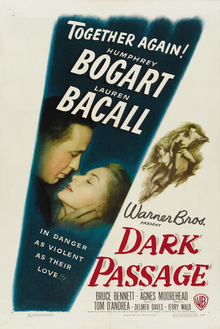
Dark Passage is a 1947 American mystery thriller film directed by Delmer Daves and starring Humphrey Bogart and Lauren Bacall. The film is based on the 1946 novel of the same title by David Goodis. It was the third of four films real-life couple Bacall and Bogart made together.

Gerald Mohr was an American radio, film, and television character actor and frequent leading man, who appeared in more than 500 radio plays, 73 films, and over 100 television shows.

Suspense is a 1946 American film noir directed by Frank Tuttle. The ice-skating-themed film stars Barry Sullivan and former Olympic skater Belita. It was also the last film appearance of actor Eugene Pallette. At a cost of 1.1 million dollars, it was considered the most expensive film put out by Monogram Pictures.

It Happens Every Spring is a 1949 American comedy film directed by Lloyd Bacon and starring Ray Milland, Jean Peters and Paul Douglas.

The Man I Love is a 1947 American film noir melodrama starring Ida Lupino, Robert Alda, Andrea King, and Bruce Bennett. Directed by Raoul Walsh, the film is based on the novel Night Shift by Maritta M. Wolff. The title is taken from the George and Ira Gershwin song "The Man I Love", which is prominently featured.
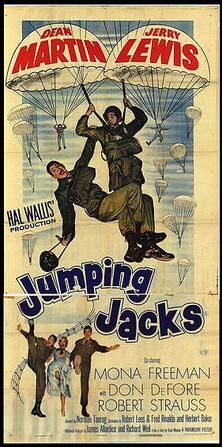
Jumping Jacks is a 1952 American semi-musical comedy film starring the comedy team of Martin and Lewis. The film was directed by Norman Taurog, and released by Paramount Pictures. It was one of the military comedies that marked the duo's early career. Brigadier General Frank Dorn, Deputy Chief of the US Army's Information Office praised Jumping Jacks as something that would "contribute to troop morale within the Army."

Across the Pacific is a 1942 American spy film set on the eve of the entry of the United States into World War II. It was directed first by John Huston, then by Vincent Sherman after Huston joined the United States Army Signal Corps. It stars Humphrey Bogart, Mary Astor, and Sydney Greenstreet. Despite the title, the action never progresses across the Pacific, concluding in Panama. The original script portrayed an attempt to avert a Japanese plan to invade Pearl Harbor. When the real-life attack on Pearl Harbor occurred, production was shut down for three months, resuming on March 2, 1942 with a revised script changing the target to Panama.

The Treasure of the Sierra Madre is a 1948 American Western film written and directed by John Huston. It is an adaptation of B. Traven's 1927 novel of the same name, set in 1925, and follows two downtrodden men who join forces with a grizzled old prospector, in searching for gold in Mexico.
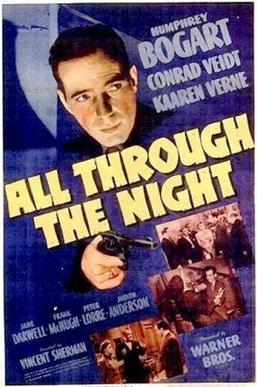
All Through the Night is a 1942 American comedy-gangster-spy thriller film directed by Vincent Sherman and starring Humphrey Bogart, Conrad Veidt and Kaaren Verne, and featuring many of the Warner Bros. company of character actors. It was released by Warner Brothers. The supporting cast features Peter Lorre, Frank McHugh, Jackie Gleason, Phil Silvers, Barton MacLane, and William Demarest.

Flight Command is a 1940 American U.S. Navy film from MGM, produced by Frank Borzage and directed by J. Walter Ruben and Frank Borzage (uncredited), starring Robert Taylor, Ruth Hussey, and Walter Pidgeon. It has the distinction of often being credited as the first Hollywood film glorifying the American military to be released after the outbreak of World War II in Europe, a year before the U.S. entered the conflict.

Lee Tung Foo was a Chinese American Vaudeville performer born in California who performed in English, German, and Latin. He became a film actor later in his life.

Singapore is a 1947 American film noir crime romance film directed by John Brahm and starring Fred MacMurray, Ava Gardner and Roland Culver. The film was remade as Istanbul (1957) with the location moved to Turkey, and Errol Flynn and Cornell Borchers in the starring roles.
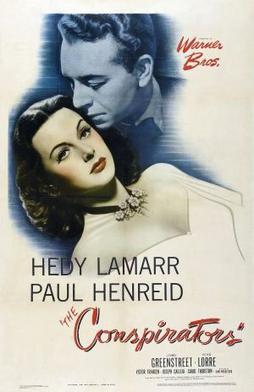
The Conspirators is a 1944 American film noir, World War II, drama, spy, and thriller film directed by Jean Negulesco. It stars Hedy Lamarr and Paul Henreid, features Sydney Greenstreet and Peter Lorre in supporting roles, and has a cameo of Aurora Miranda singing a Fado. The Conspirators reunites several performers who appeared in Casablanca (1942).
Dear Heart is a 1964 American romantic-comedy film starring Glenn Ford and Geraldine Page as lonely middle-aged people who fall in love at a hotel convention. It was directed by Delbert Mann, from a screenplay by Tad Mosel. Its theme song "Dear Heart" was nominated for the Academy Award for Best Original Song.
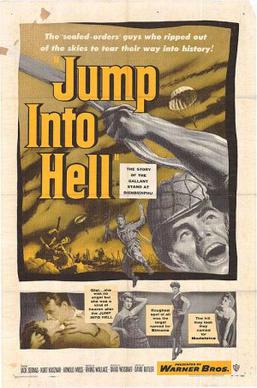
Jump into Hell is a 1955 war film directed by David Butler. The film stars Jacques Sernas and Kurt Kasznar. As the first Hollywood film based on the war in French Indochina, the story is a fictionalized account of the Battle of Dien Bien Phu.
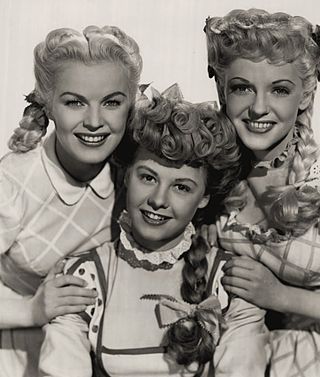
Three Little Girls in Blue is a 1946 American Technicolor musical film directed by H. Bruce Humberstone and starring June Haver along with George Montgomery, Vivian Blaine, Celeste Holm, and Vera-Ellen. The 20th Century-Fox film was adapted from Stephen Powys' 1938 play Three Blind Mice and featured songs with music by Josef Myrow and lyrics by Mack Gordon. The score is notable for the first appearance of the song "You Make Me Feel So Young".

Action in Arabia is a 1944 drama film directed by Leonide Moguy and starring George Sanders and Virginia Bruce. The film was based on the novel The Fanatic of Fez by M. V. Heberden. Action in Arabia was written by Philip MacDonald and Herbert J. Biberman. The supporting cast includes Gene Lockhart and Robert Armstrong, and the plot involves trouble and intrigue with the Nazis in Damascus, who scheme to seize control of the Suez Canal.

The Lone Wolf in London is a 1947 American mystery crime film directed by Leslie Goodwins and starring Gerald Mohr, Nancy Saunders and Eric Blore. The picture features the fictional Scotland Yard detective the Lone Wolf who travels to London, and solves the mystery of some missing jewels. It was the penultimate Lone Wolf film, followed by The Lone Wolf and His Lady in 1949, and the last for Mohr in the lead role.
Satellite in the Sky is a 1956 British CinemaScope science fiction film in Warner Color, produced by Edward J. Danziger and Harry Lee Danziger, directed by Paul Dickson, and starring Kieron Moore, Lois Maxwell, Donald Wolfit, and Bryan Forbes. The film was distributed by Warner Bros. Pictures. Special effects were by Wally Veevers, who would later work on Stanley Kubrick's 2001: A Space Odyssey (1968).
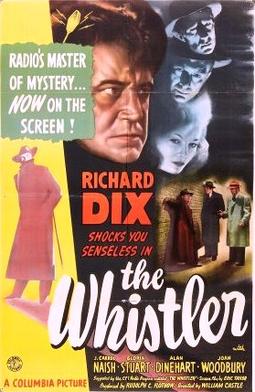
The Whistler is a 1944 American mystery film noir directed by William Castle and starring Richard Dix, Gloria Stuart and J. Carrol Naish. Based on the radio drama The Whistler, it was the first of Columbia Pictures' eight "Whistler" films starring Richard Dix produced in the 1940s. The film will be under copyright until 2040 due to renewal.


















